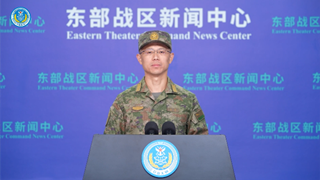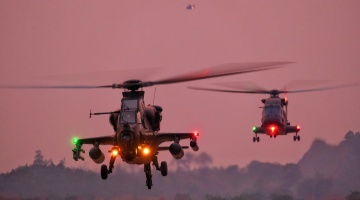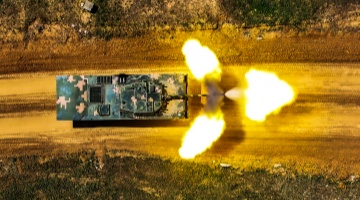By Han Jitao
According to Jiji Press of Japan, Chief Cabinet Secretary Matsuno Hirokazu stated at a press conference on April 24 that Japan will deploy Patriot Advanced Capability-3 (PAC-3) air-defense missile systems on two Okinawa Prefecture islands. And early in the morning of April 26, many local citizens of this prefecture found that a large batch of members and vehicles of the Japanese Self-Defense Force (JSDF) swarmed into many ports and streets there. On the same day, a simulated test of Japan's National Instant Warning System (J-ALERT) was held in Okinawa, the shrill alarm of which once again intensely tautened the nerves of local civilians. Local media criticized the continuous military expansion actions of the Japanese government violate the Pacifist Constitution and threaten regional security and stability.
To express their appeals for peace, a delegation from the Okinawa Prefectural Assembly of Japan submitted a resolution to the Defense Ministry, the Cabinet Office and the Foreign Ministry in Tokyo on April 24 and 25. The file questioned the new version of "Three Security Documents" issued by their government at the end of 2022 and urged the Kishida administration to scrupulously abide by the principles established in the four China-Japan political documents to promote friendship between the two countries and actively build peace through dialogues and diplomatic methods. These appeals truly reflect the collective inner voices of 1.46 million residents in Okinawa and represent the cry of peace-loving people within the country, to which the Kishida administration can't turn a deaf ear.
Profound changes have taken place in the global political landscape in these years. As the US mistakenly defines China as its "main competitor" and the North Atlantic Treaty Organization (NATO) consistently intervenes in Asia-Pacific affairs, the Japanese right-wing political forces feel that they have found an opportunity to slip the leash of the Pacifist Constitution and revive militarism. They continuously hype up so-called “China threat”, enormously increase defense budgets and develop offensive weapons to seek strike capabilities and attempt to transform the postwar international order.
A SIPRI report on April 24 shows that the 2022 defense budget of Japan increased by 5.9% and reached a record high since 1960. The so-called joint statement announced at the G7 foreign ministers' meeting held by Japan a few days ago makes irresponsible remarks on the Taiwan question and other aspects and blatantly intervenes in China's internal affairs. Not a few analysts point out that the Japanese government has deviated from the ideology of the Pacifist Constitution and made the "exclusively defense-oriented" principle a mere scrap of paper.
All these deeply disquiet the Okinawan civilians who have suffered heavily from the ravages of war. Okinawa used to be the independent Ryukyu Kingdom in history. In 1879 Japan swallowed up the kingdom and set it as the Okinawa Prefecture. Around 1/4 of local people lost their lives during the Battle of Okinawa, the most tragic event of World War II Pacific Battlefield. The 88-year-old Kodani Tatsuo has extremely painful experience from this. In March of 1945, the Japanese government forced all Okinawan civilians to commit suicide for their country, causing the 10-year-old Kodani Tatsuo to lose all his family.
Okinawa was "entrusted" to the US after WWII. In 1971, the US and Japan signed Okinawa Reversion Agreement privately and in May 1972, the US transferred the political administration power of Okinawa to Japan, without withdrawing its troops stationed there. Until now, nearly 70% of the US forces in Japan are deployed in Okinawa , which accounts for no more than 1% of the whole territory of Japan. These US soldiers enjoy extraterritorial rights and have committed a number of security accidents and crimes over the years, which brought much unbearable suffering to the local people.
The Japanese Self-Defense Force has also continuously expanded its presence in Okinawa in these years. The newly released security documents last December proposed to strengthen the Japanese self-defense forces in Okinawa. And the local media commented that the Kishida administration intends to transform this area into a "battle fortress".
Those miserable traumas from the war have made the Okinawan people realize the value of peace. The resolution submitted by the local prefectural assembly expresses their dissatisfaction and worry about the military expansion of the Japanese government, as well as appeals for China-Japan friendship and regional peace. On April 24, several Japanese citizen groups also proclaimed they will hold a large-scale peaceful assembly on May 21 to protest the JSDF deployment of missile units in this area and call for "not making Okinawa a battlefield". In a recent article on local media, Ryukyu Shimpo said that China is the largest economic partner of Japan and the two countries are indispensable to each other. The two countries should strive to ease the tension and spare no efforts to promoting peace.
In the opinion of Masaharu Kondo, former Director-General of Cabinet Legislation Bureau of Japan, the Japanese government has fundamentally changed its security policy and is obliged to give the people an answer. The Okinawan people need peace but not missiles, and the Kishida administration should listen attentively to their legitimate claims. With regard to how to improve China-Japan relations, Tokyo has more to think about.
Editor's note: Originally published on news.cri.cn, this article is translated from Chinese into English and edited by the China Military Online. The information and opinions in this article do not necessarily reflect the views of eng.chinamil.com.cn.









